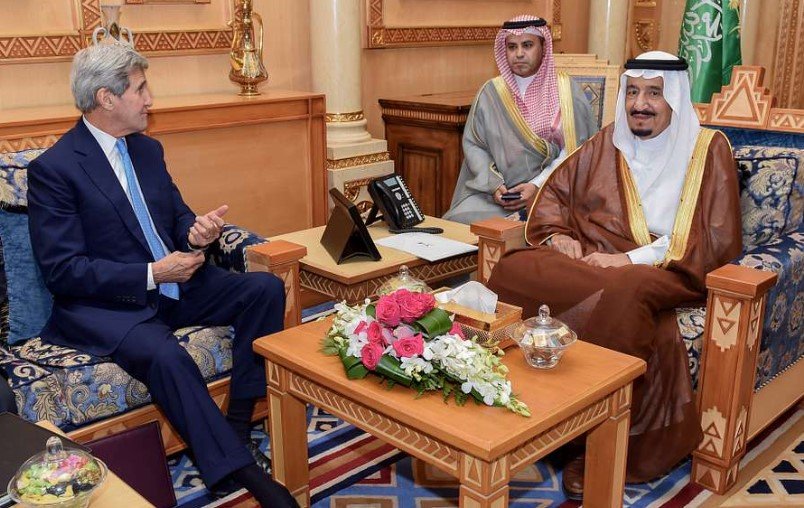Saudi Arabia and Venezuela appear to be quietly strengthening ties, with King Salman receiving a rare written message from President Nicolás Maduro that points to deeper engagement between the two oil-rich nations.
The letter, which touched on bolstering cooperation across political and economic fronts, was delivered to Saudi Vice Minister of Foreign Affairs Waleed Elkhereiji by Venezuela’s Ambassador David Velasquez Caraballo in Riyadh. While the content of the message remains under wraps, sources familiar with the matter say it carried more than just pleasantries.
A Quiet Signal in a Noisy Region
The timing of this exchange hasn’t gone unnoticed. It comes days after renewed military tensions between Iran and the U.S., with Saudi Arabia calling for restraint and a return to diplomacy.
Saudi leaders have been increasingly active on the diplomatic front, with Crown Prince Mohammed bin Salman holding back-to-back calls with European and Gulf leaders in recent days. But the letter from Maduro adds another layer, signaling potential shifts in long-term alliances that extend beyond the usual suspects.
In a region buzzing with flashpoints—from Israel’s clashes with Hezbollah to Iran’s nuclear standoff—the letter hints at quieter but no less meaningful moves between two OPEC heavyweights trying to recalibrate their roles on the global stage.

Oil, Sanctions, and Strategic Opportunity
While no formal announcements were made, the geopolitical calculus is hard to ignore. Venezuela, battered by years of sanctions, is hunting for allies beyond the Western hemisphere. For Saudi Arabia, a calculated nudge toward Caracas could offer strategic leverage, particularly inside OPEC+.
Saudi Arabia, which has been leading voluntary output cuts to maintain oil price stability, could see diplomatic benefit in bringing Venezuela—historically one of the cartel’s wildcards—closer into the fold. The Venezuelan oil sector is still under heavy U.S. sanctions, but any thaw in relations between Caracas and Riyadh could carry weight in oil markets.
It’s not just speculation. A former senior Gulf energy official, speaking anonymously due to the sensitivity of the matter, said, “The Kingdom is watching closely how Venezuela navigates its comeback under changing global pressure… A strengthened relationship gives Saudi a better grip inside OPEC when coordination gets tricky.”
What’s in It for Maduro?
For Nicolás Maduro, whose regime remains isolated by much of the West, outreach to Riyadh is part lifeline, part strategic move. Venezuela is desperate for partners who can offer diplomatic credibility and potentially open trade or technical support—particularly in energy.
According to a Latin American diplomat stationed in Riyadh, who spoke on background, “Maduro knows that if he can bring in countries like Saudi Arabia to at least listen or engage more directly, it helps break the image that he’s boxed in.”
Venezuela’s push to increase oil production, albeit with outdated infrastructure and limited capital, also makes Saudi expertise highly appealing. Riyadh, with its focus on petrochemical diversification and transition to cleaner technologies, could find limited but useful openings for cooperation that don’t break Western sanctions.
One official from the Saudi Ministry of Investment told local reporters recently that Riyadh was open to “exploratory discussions” with multiple Latin American partners—without naming Venezuela—but noted “conversations have increased since early this year.”
A Diplomatic Table Slowly Taking Shape
Here’s a quick look at recent Saudi-Venezuelan interactions:
| Date | Event | Key Actor |
|---|---|---|
| Jan 2025 | Unofficial delegation visits from Caracas | Venezuelan economic envoys |
| March 2025 | Low-profile meeting on climate initiatives | Ministry of Energy, Saudi Arabia |
| June 2025 | Written message delivered to King Salman | President Nicolás Maduro |
It’s still early days, but diplomats say this evolving communication line may eventually include trade delegations, energy cooperation talks, and even humanitarian coordination under the G77 umbrella.
Saudi Foreign Ministry Keeps Cards Close
In its official statement, the Saudi Ministry of Foreign Affairs described the letter as part of “ongoing efforts to strengthen friendly relations,” and said both sides reviewed ways to expand cooperation.
The choice of language was deliberately low-key—no mention of joint projects, trade memoranda, or follow-up visits. But officials say that’s how Riyadh prefers it. Behind closed doors, groundwork is often laid long before the first signed agreement makes headlines.
One diplomat who worked on previous Gulf-South America summits described the Saudi style this way: “They don’t like to telegraph too early. But if the letter made it all the way to King Salman, there’s definitely something cooking.”
Broader Gulf Attention to Latin America?
The Saudi-Venezuelan overture could also be part of a broader Gulf effort to deepen ties in Latin America. The UAE recently signed new trade pacts with Brazil and Chile, while Qatar has been expanding agricultural cooperation with Colombia.
Saudi Arabia has historically kept Latin America at arm’s length, focusing its energy diplomacy on Asia, Europe, and fellow Arab countries. But that could be changing.
-
In 2023, Saudi Aramco reportedly explored storage partnerships in the Caribbean.
-
In 2024, the Kingdom launched a food security dialogue with Argentina.
-
Now in 2025, Venezuela may be the next diplomatic testing ground.
This aligns loosely with Vision 2030’s call to diversify international engagement beyond traditional partners. As the Kingdom tries to reinvent itself beyond oil, new friendships—even unconventional ones—may prove useful.
Caution Still Hangs in the Air
Despite the positive tone, risks remain. Any public deal or overt economic agreement with Venezuela could provoke scrutiny from Washington, which still maintains sanctions against Caracas. Saudi Arabia is unlikely to jeopardize its relationship with the U.S., especially amid growing regional tensions involving Iran and Israel.
Still, the message from Maduro may mark a diplomatic foot in the door—one Saudi Arabia will keep half open, for now.
